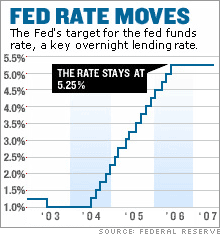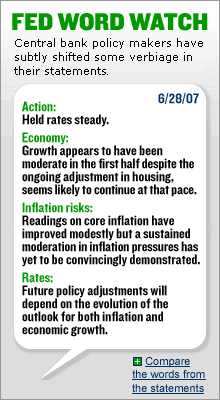Wake up time for the Fed?Despite the turmoil in the credit markets, few expect Ben Bernanke to lower rates anytime soon. But is it time for the Fed to start thinking about a rate cut?NEW YORK (CNNMoney.com) -- The Federal Reserve has been able to keep hitting the snooze alarm when it comes to interest rates for the past year, leaving the target on a key short-term interest rate at 5.25 percent since August 2006. But given what's going on in the credit markets lately, is it time for the Fed to hit the panic button?  When Fed chair Ben Bernanke and the rest of the Fed's policy making committee meets on Tuesday August 7, investors widely expect the Fed to hold pat for the ninth consecutive meeting. Still, the turmoil in the stock market and concerns about consumer debt have some investors thinking that the Fed may soon need to lower rates. In fact, according to federal funds future contracts listed on the Chicago Board of Trade, the market is pricing in about a 7 percent chance of a quarter-point rate cut on Tuesday. According to these futures, investors are betting that it is all but certain the Fed will lower rates at least once by the beginning of next year. The Fed is in a tough spot. The financial markets have been rocked in recent weeks on credit concerns, namely that the problems in the mortgage market may not be isolated to subprime borrowers. Several hedge funds and large banks have run into trouble because of exposure to subprime loans. The fear now is that this could be just the tip of the iceberg in terms of loan problems. As a result, tightened credit standards could cause not just a pullback in consumer borrowing and spending but also could spell an end to the private equity buyout boom that has helped lift stock prices for the past year. These worries might cause the Fed to rethink its stance on the economy and cause it to start lowering rates in order to prevent a notable economic slump, or even a recession. What's more, the most recent employment figures showed some signs that the job market may be weakening just a bit. The Labor Department reported Friday that 96,000 jobs were added to the nation's payrolls in July, compared to expectations of 135,000 jobs. And the unemployment rate inched up to 4.6 percent from 4.5 percent in June. But oil prices have recently run up to near record prices. And it's not the only commodity that's spiked this year: milk and wheat prices have also surged. This could keep the Fed on inflation watch for the foreseeable future, meaning the Fed would not be lowering short-term rates. In fact, the Fed could decide to raise rates if inflation pressures persist. So what will the Fed say about all this in its policy statement Tuesday? Fed watchers said it would be smart for the central bank to not dwell on the recent credit concerns since that could further spook the markets. Steve Van Order, chief fixed income strategist with Calvert Funds, said the Fed may need to amend its stance on the housing market given concerns raised by some mortgage lenders about defaults in prime loans. In June, the Fed said "the adjustment in the housing sector is ongoing." But Van Order added that the Fed could reassure investors by saying that it expects the problems in housing to be "contained" and will not have a major spill-over effect on corporate loans. "The Fed does not want to send a strong signal to the market that it's worried," Van Order said "Right now, the Fed will want to be careful. It doesn't want to seem unrealistic but it also wants to show that it's in a wait and see mode. They may not want to mention something about corporate credit now." To that end, Van Order pointed out that the market was relieved when the Fed did not mention market volatility in China in February, which caused stocks in the U.S. to nosedive, or the beginnings of the subprime problems, in its March statement. "The less the Fed says, the better," he said. Vincent Boberski, strategist with FTN Financial, agreed that it would be unwise for the Fed to discuss what's happening with corporate bonds. He argues that the Fed doesn't need to worry about a major credit crunch. Instead, what's happening now is just a return to normal credit conditions. "I would be surprised if the Fed made more than just a passing reference to the recent turmoil," Boberski said. "The issue is that people are comparing what's happening now to the easy money conditions of the past three or four years. Credit is just being distributed more rationally than it was six months ago so that's not a concern for the Fed at this point." David Resler, chief economist with Nomura Securities International, also thinks the Fed has nothing to worry about just yet. "I don't think anything that has happened since the Fed's last meeting in June is likely to significantly change the Fed's expectations for the economy in the second half of the year," Resler said. "Nothing has happened so far that would justify the likelihood of a global liquidity crisis. This is a very highly volatile period and that's unsettling but the reality is the economy is doing reasonably well." As for inflation, the Fed caused a bit of a stir by slightly amending its stance on inflation, saying that "readings on core inflation have improved modestly," a statement that the market interpreted as being less hawkish than the Fed's previous assessment of core inflation remaining "somewhat elevated." Van Order said that despite the recent spike in oil prices, he expects the Fed to stick with the "improved modestly" language on inflation and not return to the "somewhat elevated" wording since that might send the wrong message to the markets, namely that the Fed is more worried about inflation than an economic slowdown. Although Van Order does not think the Fed needs to cut rates just yet, he does think it's rational to expect a rate cut in early 2008 in order to make sure the housing woes do not cause a recession. Boberski also said that it's reasonable to expect the Fed to start lowering rates later this year, particularly since the unemployment rate is starting to drift higher and the housing market is not showing any signs of improvement any time soon. "The Fed has to balance weakness in the job market and housing market with inflation pressures. The case will get easier as time goes on to cut rates but change in stance is not warranted right now," Boberski said. But another economist said that even though he does not expect the Fed to cut rates now, it should. "Unfortunately, I don't think the Fed is going to ease at this meeting. Do I think they should? Yes. Will they? No," said Michael Strauss, chief economist with Commonfund, a money management firm. "We have a problem with what's going on in the housing sector. It's much more severe than what the Fed anticipated and is broader than subprime." |
| |||||




